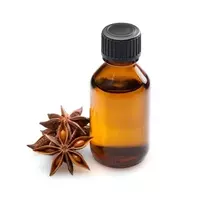Anise oil

As you know, fresh anise greens (leaves) in cooking are used in the preparation of various salads and side dishes. The fruits of this plant are flavored with sauces and gravy, which are served to meat dishes, lactic acid products, kvass and honey, bakery and confectionery. The essential oil of anise is mainly used by the liquor industry, as well as in cosmetology and perfumes.
Anise essential oil, which is also called anise oil, is a distillation product of common anise seeds, which is an annual plant found in the countries of the Americas, southern Europe, as well as a number of African states, India. Anise is also cultivated in some regions in Russia, although it is practically not found in wild-growing form. In cultural form, the plant, reaching a height of 60 centimeters, is distinguished by small white flowers and gray-brown seeds.
For the industrial production of 1 kilogram of anise oil, about 50 kilograms of mature seeds are needed, which are pre-pressed, after which they are distilled. By the way, a distinctive property of anise oil is that when the temperature decreases, it becomes a denser structure and begins to freeze, and therefore it is recommended to warm it in the hands for some time before use.
The main component of anise oil is anetol, which contains about 80-90 percent of the total substance. Another significant component is methylchavicol, which is a substance of organic origin of the phenol series. Its content in the essential oil of anise is 10 percent. In addition, a-fellandrene, acetaldehyde, a-pinene, dipentene, anisketone and camphene are present in anise oil.
It is important that the distinctive properties of anise oil determine the fact that this substance belongs to the group of potent compounds, which is why it is not recommended to be used in pregnancy and people with skin sensitivity in order to avoid their possible irritation.
Anise oil is characterized by a wide range of therapeutic and preventive effects. First of all, it works effectively for diseases of the cold type, in particular those that affect the respiratory organs. This is due to the quenching, antipyretic and softening properties of anise oil. And due to the warming effect, anise oil can generally improve the general condition of a person with colds.
In addition, essential anise oil helps to improve the functioning of the digestive tract, stimulate intestinal peristalsis, ease the condition with colic, dyspepsia and flatulence. It also helps to get rid of bouts of nausea and vomiting, which are caused primarily by nervous disorders. In some cases, the use of anise oil can help to get rid of constipation.
anise oil 899 kCal
Energy value of anise oil (Ratio of proteins, fats, carbohydrates - ju):
Proteins: 0 g (~ 0 kCal)
Fats: 99.9 g (~ 899 kCal)
Carbohydrates: 0 g (~ 0 kCal)
Energy ratio (b | y): 0% | 100% | 0%
 Español
Español Français
Français Português
Português Русский
Русский 简体中文
简体中文 繁體中文
繁體中文 日本語
日本語 한국어
한국어 العربية
العربية Türkçe
Türkçe Қазақ
Қазақ Deutsch
Deutsch Italiano
Italiano Українська
Українська
